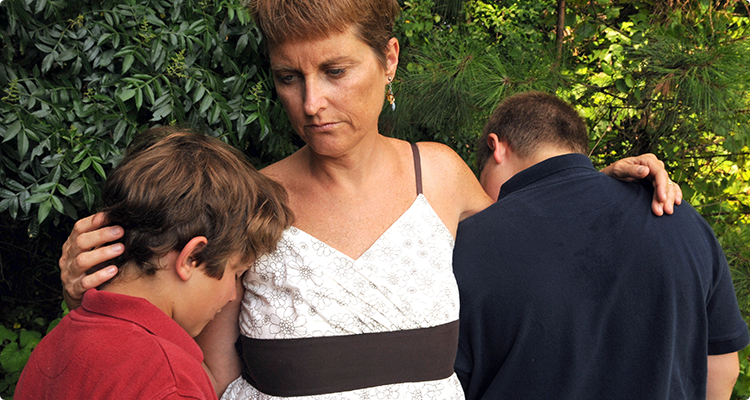If you recently lost a loved one or are experiencing another loss, the information below may help you understand grief and help you Work Through Grief.

When your loved one dies, your life is turned upside down. People will say that there is a grieving process and you will be experiencing the following:
- Denial – Refusing to believe that your loved one died. Feeling like you have no emotions, feeling in shock. “This is not real; this didn’t happen.”
- Anger – You may feel angry at someone close or the whole world. You may blame a relative or friend for what has happened or even God.
- Bargaining – You may try bargaining with God to bring your loved one back or for you to change as a result of guilt or feelings of blame.
- Depression – You may experience no energy, no desire to do anything that brought you joy in the past. You may feel overly exhausted, feel helpless, guilty or just a lack of interest in life.
- Acceptance – This is a difficult stage to go through. Facing the loss and moving on; returning to setting goals in your life; and, focusing your energy more positively. “I’m ready to deal with this now.”
You may experience all these stages or just a few. There are many factors that can influence how you grieve.
- Age
- Gender
- Multiple losses
- Type of loss
- Relationship to loved one
- Personality
- Culture
- Faith
Many describe grief as a rollercoaster of emotions. One day you are angry and the next you are depressed. This is normal. If you are depressed for any length of time and you feel that you are overwhelmed, it is always a good idea to seek professional help.
The truth is that we all grieve differently. Since we all grieve differently, you may ask, “How do I know that I am grieving healthy and I am working my way through my grief?”
Here are a few recommendations to help you work your way through your grief:
- Trusting God. Rely upon Him to lead you through your grief. The Bible shows that Jesus experienced grief and wept. He understands!
- Give yourself permission to grieve. Many times people go back to work and try to keep busy, instead of grieving your loss. Take the time you need to heal.
- Accept help from your friends.Just remember, your friends may not understand what you are truly going through or what you might need. Let your friends know what you need; provide a list.
- Count your blessings. We have all heard this phrase, “count your blessings” and you may be thinking… “What blessing? My loved one is dead”. When you are grieving it does help to thank God for all he has done and you, have to remain. This may seem difficult early on in your grief. However, by focusing on what He has done for you, it will help you grieve in a healthy manner.
- Be Honest with yourself. Tell God how you feel. He understands. He is your counselor. “…And His name will be called, Wonderful, Counselor, Mighty God, Everlasting Father, Prince of Peace.” Isaiah 9:6 NKJV
- Find a Grief Group or a friend.
There is one sure thing. You will go through your grief. Whether it be now or later. Choose to go through it now while you have support from your friends and family. “Blessed are those who mourn, for they shall be comforted.” Mathew 5:4 NKJV
Allow God to guide you. He understands your sorrows and pain. “Most assuredly, I say to you that you will weep and lament, but the world will rejoice; and you will be sorrowful, but your sorrow will be turned into joy.” John 16:20 NKJV


